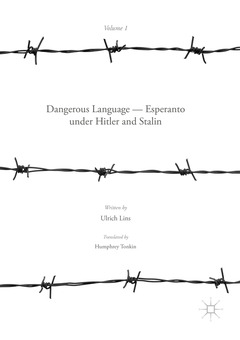Description
Dangerous Language — Esperanto under Hitler and Stalin, 1st ed. 2016
Author: Lins Ulrich
Language: English
Subjects for Dangerous Language — Esperanto under Hitler and Stalin:
Approximative price 116.04 €
In Print (Delivery period: 15 days).
Add to cartPublication date: 06-2020
Support: Print on demand
Approximative price 116.04 €
In Print (Delivery period: 15 days).
Add to cartPublication date: 02-2017
299 p. · 14.8x21 cm · Hardback
Description
/li>Contents
/li>Biography
/li>Comment
/li>
Offers a compelling, rigorously-documented account of Esperanto’s remarkable survival among the nightmares of communism and fascism
Presents a story of the language movement that outlasted the particular political ideologies of modern nation states
Examines the plight of individual Esperantists caught in the vice of repressive, nationalistic ideologies
These books may interest you

Jewish Languages from A to Z 160.25 €



